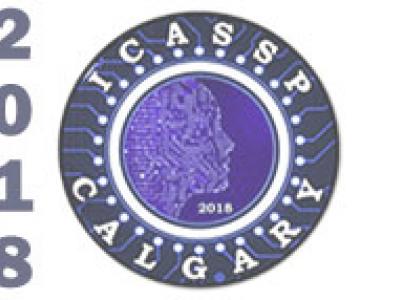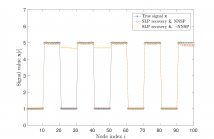
ICASSP is the world’s largest and most comprehensive technical conference focused on signal processing and its applications. The 2019 conference will feature world-class presentations by internationally renowned speakers, cutting-edge session topics and provide a fantastic opportunity to network with like-minded professionals from around the world. Visit website.

- Read more about 3D-HOG EMBEDDING FRAMEWORKS FOR SINGLE AND MULTI-VIEWPOINTS ACTION RECOGNITION BASED ON HUMAN SILHOUETTES
- Log in to post comments
Given the high demand for automated systems for human action recognition, great efforts have been undertaken in recent decades to progress the field. In this paper, we present frameworks for single and multi-viewpoints action recognition based on Space-Time Volume (STV) of human silhouettes and 3D-Histogram of Oriented Gradient (3D-HOG) embedding.
- Categories:
 13 Views
13 Views
- Read more about OPEN SET RECOGNITION BY REGULARISING CLASSIFIER WITH FAKE DATA GENERATED BY GENERATIVE ADVERSARIAL NETWORKS
- Log in to post comments
We present a new method to generate fake data in unknown classes in generative adversarial networks (GANs) framework. The generator in GANs is trained to generate somewhat similar to data in known classes but the different one by modelling noisy distribution on feature space of a classifier using proposed marginal denoising autoencoder. The generated data are treated as fake instances in unknown classes and given to the classifier to make it be robust to the real unknown classes.
- Categories:
 81 Views
81 Views
- Read more about ON ERROR RESILIENT DESIGN OF PREDICTIVE SCALABLE CODING SYSTEMS
- Log in to post comments
Scalable coding is potentially useful in content distribution over unreliable channels, as it enables meaningful reconstruction when the hierarchical bitstream is only partially received. However, its deployment in conjunction with predictive coding may result in considerable performance degradation when errors due to packet loss propagate through the prediction loop. Despite this, most existing predictive scalable coding techniques employ components whose design completely ignores the effects of unreliable channel conditions.
- Categories:
 6 Views
6 Views
- Read more about CLUSTERING-GUIDED GP-UCB FOR BAYESIAN OPTIMIZATION
- Log in to post comments
Bayesian optimization is a powerful technique for finding extrema of an objective function, a closed-form expression of which is not given but expensive evaluations at query points are available. Gaussian Process (GP) regression is often used to estimate the objective function and uncertainty estimates that guide GP-Upper Confidence Bound (GP-UCB) to determine where next to sample from the objective function, balancing exploration and exploitation. In general, it requires an auxiliary optimization to tune the hyperparameter in GP-UCB, which is sometimes not easy to carry out in practice.
- Categories:
 102 Views
102 Views
- Read more about Speech Dereverberation based on Convex Optimization Algorithms for Group Sparse Linear Prediction
- Log in to post comments
In this paper, we consider methods for improving far-field speech recognition using dereverberation based on sparse multi-channel linear prediction. In particular, we extend successful methods based on nonconvex iteratively reweighted least squares, that look for a sparse desired speech signal in the short-term Fourier transform domain, by proposing sparsity promoting convex functions. Furthermore, we show how to improve performance by applying regularization into both the reweighted least squares and convex methods.
- Categories:
 54 Views
54 Views
- Categories:
 10 Views
10 Views
- Read more about ANTENNA SELECTION FOR LARGE-SCALE MIMO SYSTEMS WITH LOW-RESOLUTION ADCS
- Log in to post comments
- Categories:
 16 Views
16 Views
- Read more about The Network Nullspace Property for Compressed Sensing of Big Data over Networks
- Log in to post comments
- Categories:
 17 Views
17 Views
- Read more about Narrowband Channel Estimation for Hybrid Beamforming Millimeter Wave Communication Systems with One-Bit Quantization
- Log in to post comments
Millimeter wave (mmWave) spectrum has drawn attention due to its tremendous available bandwidth. The high propagation losses in the mmWave bands necessitate beamforming with a large number of antennas. Traditionally each antenna is paired with a high-speed analog-to-digital converter (ADC), which results in high power consumption. A hybrid beamforming architecture and one-bit resolution ADCs have been proposed to reduce power consumption. However, analog beamforming and one-bit quantization make channel estimation more challenging.
- Categories:
 11 Views
11 Views
- Read more about Learning convolutional sparse coding
- 1 comment
- Log in to post comments
We propose a convolutional recurrent sparse auto-encoder
model. The model consists of a sparse encoder, which is a
convolutional extension of the learned ISTA (LISTA) method,
and a linear convolutional decoder. Our strategy offers a simple
method for learning a task-driven sparse convolutional
dictionary (CD), and producing an approximate convolutional
sparse code (CSC) over the learned dictionary. We trained
the model to minimize reconstruction loss via gradient decent
with back-propagation and have achieved competitve
- Categories:
 35 Views
35 Views